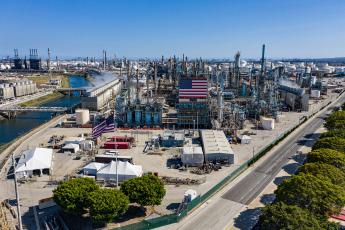100+ energy, ag & transportation groups urge Congress to reverse CA vehicle ban
WASHINGTON, D.C. — The American Fuel & Petrochemical Manufacturers (AFPM) today joined 110 other stakeholders across energy, agricultural and transportation supply chains urging Congressional leadership to use the Congressional Review Act (CRA) to protect American consumers and reverse California’s harmful vehicle mandates, including its expansive ban on sales of new gas, diesel and traditional hybrid cars and trucks over the next decade.
AFPM welcomes reconsideration of EPA vehicle and manufacturing regs
AFPM President and CEO Chet Thompson issued the following statement on today’s announcements that EPA will re-open and reconsider a number of regulations finalized under the Biden-Harris administration, including vehicle tailpipe standards, the Risk Management Program rule, National Ambient Air Quality Standards (NAAQS) and air toxic regulations.
AFPM: Tariffs will not make us more energy secure
WASHINGTON, D.C. — American Fuel & Petrochemical Manufacturers (AFPM) President and CEO Chet Thompson issued the following statement on the tariffs being levied today on Canada and Mexico.
AFPM: Support the CRA. CA gas car ban will impact the entire country.
WASHINGTON, D.C. — American Fuel & Petrochemical Manufacturers (AFPM) President and CEO Chet Thompson issued the following statement today on EPA’s transmission to Congress of the December 2024 waiver authorizing California’s Advanced Clean Cars II (ACCII) program.
FAQs on California’s gas car ban
California’s Advanced Clean Cars II regulation is in the news again and you might have some questions. Below is an overview of the California policy and whether or not EPA has to affirmatively grant California’s waiver requests.
California’s gas car ban and the Congressional Review Act (CRA)
Congress has an opportunity to overturn EPA’s December 2024 decision allowing California to ban sales of new gas, diesel and traditional hybrid vehicles. Why should elected officials support the CRA?
U.S. refiners & petrochemical manufacturers hope for quick tariff resolution
AFPM President and CEO Chet Thompson issued the following statement addressing the announced tariffs being levied on Canada and Mexico.
What’s the difference between heavy and light crude oils? And why do American refineries need both?
There are hundreds of varieties of crude oil around the world. Different types of oil require different refining processes to make the fuels we need in the quantities we need. Many American refineries need heavier crudes than what is largely produced in the United States.
How much oil does the United States import (and why)?
About 60% of the crude oil that runs through U.S. refineries is extracted right here at home. However, our refineries run on many different types of crude oil, some of which we don’t produce here or can’t economically transport. In those cases, we use imports.








